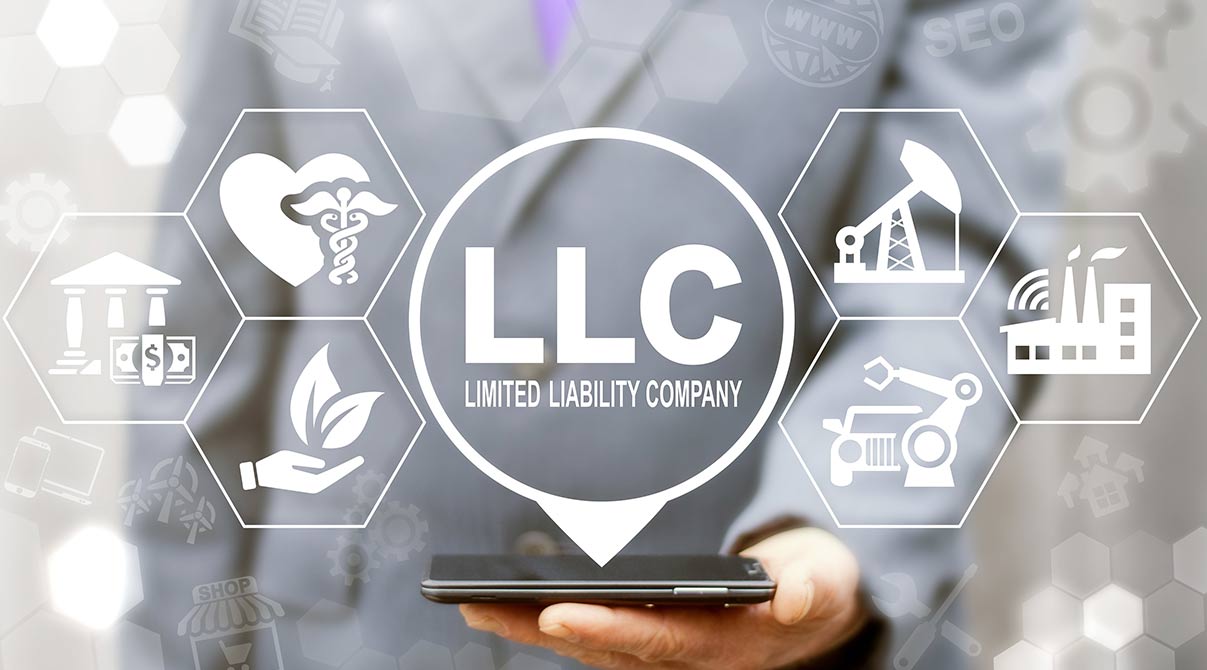Opening a Limited Liability Company (LLC) in the United States is an aspiration shared by entrepreneurs worldwide. For Pakistanis looking to expand their business horizons and tap into the vast opportunities presented by the U.S. market, forming an LLC on American soil has become an increasingly viable and lucrative option. This comprehensive guide aims to demystify the intricate process of establishing an LLC in the USA, offering a roadmap tailored specifically for Pakistani entrepreneurs seeking to embark on this exciting journey.
The decision to form an LLC in the United States carries significant weight for Pakistanis with entrepreneurial ambitions. An LLC not only provides the advantages of limited liability protection but also opens doors to the world’s largest and most dynamic economy. With access to a robust consumer base, cutting-edge technology, and global investment opportunities, choosing to establish an LLC in the USA represents a strategic move that can redefine the trajectory of your business endeavors.
What is an LLC?

An LLC, which stands for “Limited Liability Company,” is a flexible and widely favored business structure in the United States. It combines elements of both a corporation and a partnership, offering business owners a unique blend of liability protection and operational flexibility. At its core, an LLC is a legal entity that shields its owners, known as members, from personal liability for the company’s debts and legal obligations. This means that in most cases, the personal assets of the members, such as homes or savings, are protected from business-related liabilities, reducing the financial risk associated with entrepreneurship.
One of the defining features of an LLC is its simplicity in terms of administrative requirements and taxation. Unlike a corporation, LLCs typically don’t require a board of directors or shareholder meetings, making them easier to manage. Additionally, LLCs enjoy the flexibility of pass-through taxation, which means that the business itself doesn’t pay federal income tax. Instead, profits and losses “pass through” to the members, who report them on their individual tax returns. This tax treatment can result in tax advantages for LLC members, making it an attractive choice for various types of businesses, from small startups to larger enterprises.
Comparison of LLC With Other Business Structures

When choosing the right legal structure for your business, it’s essential to consider the advantages and disadvantages of various options. Let’s compare an LLC with some common business structures, such as Sole Proprietorship, Corporation, Limited Liability Partnership (LLP), and Limited Company (Ltd):
1. Sole Proprietorship
A Sole Proprietorship is the simplest form of business structure, where an individual owns and operates the business alone. Unlike an LLC, there’s no legal separation between the business and the owner, leaving the owner with unlimited personal liability for business debts and obligations.
- Liability: Sole proprietors have unlimited personal liability for business debts. If the business faces financial trouble, personal assets are at risk.
- Taxation: Income is reported on the owner’s personal tax return, making tax filing straightforward. However, there are no separate tax benefits.
2. Corporation
A Corporation, on the other hand, is a separate legal entity owned by shareholders, providing limited liability protection to its shareholders. Unlike an LLC, corporations often face double taxation, where the company’s profits are taxed at the corporate level, and dividends are taxed again at the individual level, making them a more complex tax structure.
- Liability: Shareholders in a corporation have limited liability, which means their personal assets are generally protected from business debts.
- Taxation: Corporations face double taxation, with profits taxed at the corporate level and dividends taxed at the individual level. However, they offer potential tax advantages for larger companies.
3. Limited Liability Partnership (LLP)
A Limited Liability Partnership (LLP) is a partnership where all partners have limited liability, safeguarding their personal assets. While it shares limited liability with an LLC, LLPs are often used by professionals (e.g., lawyers, accountants) and may require more formalities in their formation and operation, differing from the operational flexibility of an LLC.
- Liability: LLPs provide limited liability to all partners, protecting their personal assets from business liabilities.
- Taxation: Like sole proprietorships, LLPs have pass-through taxation, where profits and losses are reported on partners’ individual tax returns.
4. Limited Company (Ltd)
Lastly, a Limited Company (Ltd) is a legal entity distinct from its owners (shareholders), offering limited liability protection to its shareholders. Unlike an LLC, limited companies may have more complex governance structures and could be better suited for larger businesses that require a more formalized management and ownership system.
- Liability: Limited companies offer limited liability to shareholders, similar to corporations. Personal assets are typically shielded from business debts.
- Taxation: They may have more complex tax structures, but they can provide tax planning opportunities, especially for larger businesses.
Now, let’s bring the focus back to the Limited Liability Company (LLC) and see how it compares:
- Liability: Like corporations and limited companies, LLC members enjoy limited liability, protecting their personal assets. This feature is a significant advantage over sole proprietorships and partnerships.
- Taxation: LLCs combine liability protection with the simplicity of pass-through taxation. This means that, unlike corporations, LLCs avoid double taxation. Profits and losses flow through to the members, who report them on their individual tax returns. This can result in tax advantages while maintaining the protection of personal assets.
Therefore, an LLC offers a compelling blend of limited liability and favorable tax treatment, making it an attractive choice for many entrepreneurs. It strikes a balance between the simplicity of sole proprietorships or partnerships and the asset protection of corporations or limited companies, making it a versatile option for a wide range of businesses. However, the choice ultimately depends on your specific business goals and needs, so it’s advisable to consult with legal and financial professionals before making a decision.
Benefits of an LLC

Limited Liability Companies (LLCs) have gained immense popularity among entrepreneurs for several compelling reasons:
Limited Liability Protection
One of the most significant advantages of forming an LLC is the protection it offers to its members. LLC members’ personal assets, such as homes and savings, are shielded from the business’s debts and legal liabilities. In essence, if the LLC encounters financial difficulties or faces legal action, the personal wealth of its members remains secure. This limited liability protection provides peace of mind, reducing the inherent risks associated with running a business, a feature that sole proprietors and general partners often lack.
Pass-Through Taxation
LLCs enjoy a tax structure known as pass-through taxation. This means that the LLC itself is not subject to federal income tax. Instead, profits and losses “pass through” to the individual members, who report them on their personal tax returns. This simplicity eliminates the double taxation faced by corporations, where profits are taxed both at the corporate and individual levels. Pass-through taxation can result in substantial tax advantages for LLC members and simplifies the tax-filing process.
Flexibility in Management
LLCs offer remarkable flexibility in how they are structured and managed. Members have the autonomy to decide the management structure, whether it’s member-managed, where all members participate in day-to-day operations, or manager-managed, where they designate a manager or managers to oversee operations. This flexibility allows businesses to adapt their management styles to suit their unique needs and organizational dynamics.
Ease of Compliance
Compared to corporations, LLCs typically have fewer administrative requirements. They don’t need to hold annual shareholder meetings or adhere to as many formalities. This streamlined approach to compliance reduces paperwork and administrative burdens, making it an attractive choice for small and medium-sized businesses seeking simplicity in governance.
Enhanced Credibility
Operating as an LLC can enhance a business’s credibility in the eyes of customers, suppliers, and potential partners. The “LLC” designation signifies a commitment to a formal business structure and legal compliance, which can inspire trust and confidence. It often signals to stakeholders that the business is well-organized and professionally managed, which can be advantageous when seeking financing or establishing business relationships.
These benefits contribute to the enduring appeal of the LLC structure in the business world.
Types of LLC

Limited Liability Companies (LLCs) offer various structures to cater to the diverse needs of businesses and entrepreneurs. These different types of LLCs provide flexibility and customization:
Single-Member LLC
A Single-Member LLC is a type of limited liability company owned and operated by a single individual or entity. It’s an attractive choice for solo entrepreneurs and small business owners seeking both the simplicity of a sole proprietorship and the added protection of limited liability. In a Single-Member LLC, the sole owner is typically responsible for all aspects of the business, from decision-making to management. While this structure provides personal liability protection, it’s characterized by its ease of management, making it a popular option for those looking to maintain full control over their business affairs.
Multi-Member LLC
A Multi-Member LLC is a limited liability company with two or more owners, known as members. This structure is well-suited for partnerships, family businesses, or ventures involving multiple stakeholders. Multi-Member LLCs provide the same liability protection as their single-member counterparts, shielding members’ personal assets from business debts and liabilities. However, they require a well-defined operating agreement that outlines member roles, contributions, and profit-sharing. Multi-Member LLCs offer the advantage of diversified expertise and resources, as multiple individuals or entities collaborate to manage and grow the business, making them a versatile choice for various business endeavors.
Series LLC
A Series LLC is a specialized form of LLC that permits the creation of multiple “series” or subdivisions within a single LLC framework. Each series can have its distinct assets, members, and business purposes while benefiting from the overall liability protection of the parent LLC. This structure proves invaluable for businesses with diverse assets or ventures, providing enhanced asset protection and organizational efficiency by segregating risk among different series.
Specialized LLCs (e.g., Professional LLC, Series LLC)

Specialized LLCs cater to specific needs and industries. The Professional LLC (PLLC) is designed for licensed professionals like doctors, lawyers, architects, and accountants. It enables these professionals to form an LLC while maintaining their individual professional licenses, safeguarding personal assets from the actions of other members. Additionally, the Series LLC offers cost savings and reduced administrative burdens, making it a powerful choice for businesses with multiple ventures or real estate holdings under a single umbrella.
Member-Managed LLCs
Member-Managed LLCs, as the name suggests, have all members actively involved in the daily operations and decision-making of the business. This structure is suitable for small businesses where all owners want to have a hands-on role in the company’s management. Members collectively make key decisions, including those related to business strategy, finances, and day-to-day operations. It’s a democratic approach to LLC management that can be advantageous when there’s a close-knit group of involved owners.
Manager-Managed LLCs
Manager-Managed LLCs designate one or more managers to handle the daily operations of the business. This structure is useful when some members prefer a passive role in the business or when professional management expertise is required. Managers are responsible for making operational decisions, while the members typically retain authority over significant matters, such as changes to the LLC’s structure or the admission of new members. Manager-Managed LLCs provide a clear division of labor within the organization.
Foreign LLCs
Foreign LLCs are LLCs registered in a state (domestic state) different from the state where they conduct business operations (foreign state). These entities are subject to the laws and regulations of both their domestic and foreign states. Operating as a foreign LLC often involves registering with the foreign state’s business authorities, obtaining any required licenses or permits, and complying with tax obligations in both states. This structure is commonly used by businesses expanding their operations across state lines or internationally.
Non-Profit LLCs
Non-Profit LLCs are organized for charitable, educational, religious, scientific, or other non-profit purposes. They share similarities with traditional LLCs but have specific distinctions. Non-Profit LLCs are exempt from federal income tax under Section 501(c)(3) of the Internal Revenue Code. To maintain their non-profit status, they must meet certain criteria, such as serving a charitable mission and engaging in activities that benefit the public. Non-Profit LLCs are governed by a board of directors or members and must adhere to specific reporting requirements to demonstrate their non-profit activities.
Low-Profit Limited Liability Company (L3C)
The L3C is a relatively new and specialized form of LLC designed for businesses that aim to achieve a specific social mission while generating some profit. L3Cs bridge the gap between for-profit and non-profit entities. They attract investors who are interested in both financial returns and social impact. To qualify as an L3C, a business must primarily pursue a charitable, educational, religious, literary, scientific, or artistic mission. While L3Cs are allowed to generate profits, these profits should be secondary to their social mission. L3Cs often appeal to impact investors and philanthropic organizations looking to support businesses that align with their social goals.
These various types of LLCs cater to a wide range of business needs, from member preferences to industry-specific requirements. Selecting the right type of LLC is crucial for aligning the legal and operational structure of the business with its goals and circumstances.
Best States to Open an LLC in the USA

Opening a Limited Liability Company (LLC) in the United States presents a world of opportunities for Pakistani entrepreneurs. However, selecting the right state for your LLC is a critical decision that can significantly impact your business’s success. Here, we explore the best states to consider, taking into account business-friendly environments, cost-effectiveness, key influencing factors, and real-world case studies.
Factors Influencing State Selection
- Taxation: Consider the state’s tax structure, including income tax, corporate tax, and sales tax. Some states, like Wyoming and Nevada, have advantageous tax policies, while others may impose higher tax burdens.
- Regulations: Examine the regulatory environment. States like Delaware often provide more predictable and business-friendly regulations, which can streamline compliance and operations.
- Legal Protections: Look for strong legal protections for business owners, including liability protection and privacy safeguards.
- Costs: Evaluate formation and maintenance costs, as they can vary significantly between states.
Top States for Business-Friendly Environments
- Delaware: Delaware is renowned for its favorable business laws, including a separate court system, the Delaware Court of Chancery, dedicated to business matters. Its business-friendly environment, strong legal framework, and efficient business registration process make it a top choice for many entrepreneurs, both domestic and international.
- Nevada: Nevada is celebrated for its low taxes, including no state income tax or corporate tax. Additionally, it offers robust privacy protections and minimal reporting requirements, making it an attractive destination for businesses looking to maximize profits.
- Wyoming: Wyoming is known for its business-friendly regulations and low fees. It boasts a fast LLC formation process, strong asset protection laws, and no state corporate income tax. These factors make it an appealing option for entrepreneurs seeking simplicity and asset protection.
Case Studies of Successful LLCs in Different States

Here are case studies of successful LLCs in different states in the USA, highlighting some of the most prominent ones:
1. Google LLC (Delaware)
Google LLC, one of the world’s leading technology companies, is registered in Delaware. Delaware’s business-friendly environment and well-established corporate laws have attracted giants like Google. The state offers a predictable legal framework and efficient court system, which is particularly advantageous for large corporations facing complex legal matters.
2. Tesla, Inc. (California)
Tesla, Inc., the pioneering electric vehicle and clean energy company, is headquartered in Palo Alto, California. Despite California’s higher taxes and regulatory complexity, it has been a magnet for tech startups and innovators like Tesla, benefiting from proximity to Silicon Valley’s talent pool and venture capital.
3. Zappos.com (Nevada)
Zappos.com, the renowned online shoe and clothing retailer, chose to establish its LLC in Nevada. The state’s tax advantages, including no corporate income tax, have made it an attractive destination for businesses looking to maximize profits. Zappos’ success showcases how favorable tax policies can boost a company’s bottom line.
4. Casper Sleep Inc. (Delaware)
Casper Sleep Inc., a popular mattress and sleep products company, is another example of a successful Delaware LLC. Delaware’s legal framework has provided Casper with the stability and legal protections necessary for its rapid growth in the e-commerce sector.
5. The Cheesecake Factory Incorporated (California)
The Cheesecake Factory Incorporated, a well-known restaurant chain, operates from California. While the state’s regulations can be challenging for restaurant businesses, its thriving food scene and access to diverse markets have allowed The Cheesecake Factory to flourish.
6. Walmart Stores, Inc. (Arkansas)
Walmart Stores, Inc., one of the world’s largest retail corporations, is headquartered in Bentonville, Arkansas. Arkansas offers a cost-effective business environment, which has been beneficial for Walmart’s expansion and its ability to provide value to consumers.
7. Berkshire Hathaway Inc. (Nebraska)
Berkshire Hathaway Inc., the multinational conglomerate led by Warren Buffett, is based in Omaha, Nebraska. Nebraska’s lower cost of living and steady business climate have contributed to the success of this investment holding company.
These case studies demonstrate that successful LLCs can thrive in various states across the USA, each offering unique advantages and challenges. Learning from successful LLCs in different states can offer valuable insights as you embark on your entrepreneurial journey from Pakistan to the United States.
Cheapest LLCs in the USA

For entrepreneurs, especially foreign ones, seeking to establish a cost-effective Limited Liability Company (LLC) in the United States, it’s essential to consider not only the initial registration costs but also the long-term maintenance expenses. Here’s an overview of the cheapest LLC options, considerations, and factors to keep in mind:
States with Low Registration and Maintenance Costs
States like Wyoming, Nevada, and New Mexico are often recognized for their low registration and annual maintenance costs. These states offer competitive filing fees, minimal annual report fees, and no franchise taxes. Choosing such states can significantly reduce the upfront and ongoing expenses associated with maintaining an LLC.
Exploring Cost-Effective Options for Foreign Entrepreneurs
Foreign entrepreneurs often look to Delaware due to its reputation as a business-friendly state. While Delaware offers numerous advantages, such as strong legal protections, it’s essential to weigh these benefits against its relatively higher registration and annual fees. States like Wyoming and New Mexico provide similar liability protection at a lower cost, making them attractive choices for cost-conscious foreign entrepreneurs.
Considerations Beyond Initial Costs
While minimizing initial and annual costs is crucial, entrepreneurs should also consider factors like state regulations, taxes, and legal infrastructure. A state with extremely low costs may lack the regulatory and legal advantages offered by more established states. It’s essential to strike a balance between affordability and the overall business environment to ensure long-term success.
Why Open an LLC in the USA?

For international entrepreneurs, opening a Limited Liability Company (LLC) in the United States offers a multitude of advantages that can drive business growth and success. The United States boasts the world’s largest economy, offering a vast consumer base and diverse market opportunities. Establishing an LLC in the USA allows entrepreneurs to tap into this robust economy, positioning their businesses for scalability and revenue growth.
The USA provides a stable and well-established legal system, offering entrepreneurs protection for their assets and intellectual property. International entrepreneurs can benefit from the simplicity and flexibility of the LLC structure, which combines limited liability with pass-through taxation. This structure minimizes personal risk and simplifies tax compliance.
Having a presence in the USA can enhance an international business’s credibility and visibility on the global stage. It can attract American customers and investors who often prefer to engage with companies registered within the country. Furthermore, the USA serves as a gateway to North American and global markets, providing access to a vast network of potential clients and partners. Opening an LLC in the USA is a strategic move that positions businesses for growth and success in the competitive global marketplace, offering legal and financial benefits along with the opportunity to attract global customers and investors.
Why Should Pakistanis Open an LLC in USA?

Opening an LLC in the United States presents unique advantages for Pakistani entrepreneurs that can significantly boost their business prospects and international presence.
Unique Advantages for Pakistanis
- Global Expansion: Establishing an LLC in the USA allows Pakistani entrepreneurs to expand their businesses on a global scale. The United States serves as a strategic gateway to North American and international markets, offering access to a diverse and affluent customer base. This global reach can significantly enhance market penetration and revenue growth.
- Asset Protection: The LLC structure provides invaluable personal liability protection, shielding the personal assets of Pakistani entrepreneurs from potential business-related liabilities and legal disputes. This protection is especially vital when entering foreign markets with varying legal systems, offering peace of mind and financial security.
- Tax Efficiency: The pass-through taxation system of an LLC simplifies tax reporting for Pakistani entrepreneurs. This system ensures that profits generated within the USA are not subject to double taxation, mitigating the risk of paying taxes both in the USA and in Pakistan. It results in tax savings and streamlined financial management.
- Enhanced Credibility: Operating as an LLC in the USA can significantly boost the credibility of Pakistani businesses on the global stage. The “LLC” designation signifies a commitment to a formal business structure and legal compliance. This enhanced credibility can attract international customers, partners, and investors seeking reliable and professionally managed companies.
- Access to Funding: The USA offers a robust ecosystem of venture capital, angel investors, and financial institutions. Pakistani entrepreneurs with LLCs in the USA can tap into this network to secure funding and fuel business expansion. Access to American investors and lenders can be a game-changer for businesses seeking capital for growth and innovation.
Strengthening International Business Ties
Opening an LLC in the USA isn’t just about business; it’s also about fostering stronger international relations. Pakistanis who choose to invest in the United States through an LLC contribute to the economic and diplomatic ties between the two countries, strengthening the bond between Pakistan and the USA.
By operating businesses in the USA, Pakistani entrepreneurs engage in economic cooperation that promotes trade, job creation, and shared prosperity in both nations. Entrepreneurial ventures also bridge cultures, enriching American society and fostering a deeper understanding of Pakistan. Successful business ventures by Pakistani entrepreneurs can positively influence diplomatic relations, opening doors for constructive dialogues and further collaboration.
Success Stories of Pakistani Entrepreneurs in the USA
Pakistani entrepreneurs have made impressive strides in the USA, serving as inspirational success stories for future generations. These case studies emphasize the potential for Pakistanis to excel on the international stage.
Shahid Khan, owner of the Jacksonville Jaguars and Fulham F.C., and Salman Khan, the founder of Khan Academy, have not only excelled in their respective fields but also contributed to global sports and education. Monis Rahman, founder of Rozee.pk, has transformed the job market in Pakistan, impacting lives significantly. These entrepreneurs showcase the opportunities available in the USA for those with vision and determination, inspiring others to follow in their footsteps.
Legal Requirements

As a non-U.S. resident, starting an LLC in the United States is a viable endeavor, but it entails adherence to specific legal requirements, visa considerations, and state-specific regulations. Understanding these key aspects is crucial to successfully establish your LLC as a foreign individual or entity.
Eligibility Criteria for Foreign Individuals or Entities
Non-U.S. residents, including foreign individuals, corporations, and other entities, can indeed form and own LLCs in the USA. However, to do so, certain legal and visa prerequisites must be met:
- Valid Visa: Non-U.S. residents looking to establish an LLC in the USA must possess a valid visa that permits engagement in business activities. Visa options include E-2 visas for treaty investors or L-1 visas for intracompany transferees. Alternatively, passive investment in an LLC may not necessitate a visa. It’s important to ensure compliance with visa requirements and eligibility criteria.
- U.S. Address and Phone Number: Some states may require LLC owners to have a U.S. address and phone number. These requirements vary by state, so it’s advisable to investigate the specific prerequisites of the state where you intend to establish your LLC.
State-Specific Regulations and Compliance
Each state within the USA maintains its unique set of regulations and compliance requirements for LLC formation. These can encompass:
- Registered Agent: Several states mandate that LLCs designate a registered agent, responsible for receiving legal documents and official communications on behalf of the LLC. Depending on the state, the registered agent may need to be a resident of that state.
- Tax Identification Number: Obtaining a tax identification number (TIN) is essential for tax purposes. This unique identifier is issued by the Internal Revenue Service (IRS) and is required to open a business bank account, file tax returns, and fulfill specific licensing and permit obligations. This number is essential for tax reporting and banking purposes. Foreign-owned LLCs must adhere to federal and state tax laws.
Required Documentation and Forms
To initiate the process of forming an LLC as a non-U.S. resident, certain documentation and forms must be prepared and submitted:
- Articles of Organization: Often referred to as the Certificate of Formation, this legal document officially establishes your LLC. It should be filed with the state where you plan to establish your LLC, accompanied by the appropriate filing fees.
- Operating Agreement: While not mandatory in all states, an operating agreement is advisable as it outlines the LLC’s ownership structure, management, and operational procedures.
- Employer Identification Number (EIN): To fulfill tax obligations, an EIN must be obtained from the IRS. As a non-U.S. resident, you can apply for an EIN through the IRS website or by mail, fax, or phone. The application involves submitting Form SS-4, which requires essential information, including your LLC’s name and your personal details.
- Individual Taxpayer Identification Number (ITIN): If you lack a Social Security Number (SSN) and are a non-U.S. resident, you may need to acquire an Individual Taxpayer Identification Number (ITIN) for tax compliance purposes. This is typically done by submitting Form W-7 to the IRS.
Understanding and fulfilling these legal requirements and forms is fundamental to successfully launching your LLC in the United States as a non-U.S. resident. Additionally, consulting with a tax professional is highly recommended to navigate the complexities of U.S. taxation for foreign entrepreneurs.
Business Plan and Strategy
Developing a robust business plan is pivotal when establishing an LLC in the USA as a non-U.S. resident. This plan should encompass key elements such as an executive summary, market analysis, company description, product or service details, marketing and sales strategies, management team profiles, and financial projections. Additionally, setting clear and measurable business goals guides your LLC’s growth, motivating your team and providing benchmarks for success. When entering the market, conducting a thorough competition analysis is vital. Identify your competitors’ strengths and weaknesses, understand market dynamics, and employ effective market entry strategies, including marketing, branding, and risk mitigation tactics. A well-structured business plan and strategic approach are essential for achieving your entrepreneurial aspirations in the U.S. market.
Taxation for LLCs

Understanding the intricacies of taxation is a critical aspect of managing an LLC in the USA as a non-U.S. resident. Taxation for foreign-owned LLCs involves navigating U.S. tax laws and obligations, comprehending the unique tax implications, and implementing effective tax planning and compliance strategies.
Understanding US Tax Laws and Obligations
Comprehending U.S. tax laws and obligations is paramount for foreign-owned LLCs. Key considerations include:
- Federal Taxes: Foreign-owned LLCs must navigate federal tax laws, including income taxes, employment taxes, and self-employment taxes. Understanding these tax categories, their rates, and applicable deductions is crucial.
- State Taxes: LLCs may be subject to state-level taxes, which can vary significantly from one state to another. State tax obligations may include income tax, sales tax, and property tax. Research and compliance with state-specific tax requirements are essential.
- Employment Tax: If your LLC hires employees, you’ll need to understand and comply with federal and state employment tax obligations, including payroll taxes, Social Security, and Medicare taxes.
Tax Implications for Foreign-Owned LLCs
Foreign-owned LLCs encounter unique tax implications that differ from those of domestic LLCs. These implications encompass:
- Pass-Through Taxation: By default, LLCs are treated as pass-through entities, meaning that profits and losses flow through to the owners’ personal tax returns. Foreign owners must comprehend this tax structure and its potential impact on their personal tax obligations.
- Tax Treaties: Explore any tax treaties between the U.S. and your home country, as they can influence your LLC’s tax obligations. These treaties may impact withholding rates, deductions, and credits.
- Individual Taxpayer Identification Number (ITIN): Non-U.S. residents often require an ITIN to fulfill tax obligations. Obtaining an ITIN is crucial, as it enables you to file taxes and comply with IRS requirements.
Tax Planning and Compliance
Effective tax planning and compliance strategies are essential for foreign-owned LLCs. Consider the following:
- Professional Advice: Consult with tax professionals experienced in international taxation to ensure proper planning and compliance. They can help you navigate complex tax laws and identify opportunities for tax savings.
- Record Keeping: Maintain meticulous financial records to support your tax filings and deductions. Proper record-keeping is critical for demonstrating compliance with tax laws and regulations.
- Estimated Taxes: Understand and meet estimated tax payment obligations, as failure to do so can result in penalties and interest charges.
- Continual Monitoring: Stay informed about changes in U.S. tax laws and regulations. Taxation rules can evolve, and staying updated ensures ongoing compliance.
Therefore, understanding U.S. tax laws, recognizing tax implications for foreign-owned LLCs, and implementing effective tax planning and compliance strategies are essential for ensuring your LLC’s financial health and legal compliance in the United States.
Funding and Capital

Starting and managing an LLC in the USA as a non-U.S. resident involves securing funding, making thoughtful investment decisions, and practicing sound financial management.
Funding Options for Starting an LLC in the USA
Securing capital for your non-U.S. resident LLC in the USA is a vital initial step. You can use personal savings, providing full control but carrying personal financial risk. Alternatively, seek investments from various sources, including domestic and international investors, such as angel investors, venture capitalists, or crowdfunding platforms. Explore small business loans, lines of credit, and potential government programs for eligible entrepreneurs.
Investment Sources and Considerations
Understanding key factors when seeking investment is crucial. Recognize the preferences and expectations of potential investors, considering equity offers or loans with varying implications. Conduct thorough due diligence on investors, evaluating their track record and alignment with your goals. Work with legal professionals to create clear investment agreements.
Financial Management and Budgeting
Effective financial management is fundamental. Develop a detailed budget to monitor income and expenses. Manage cash flow for financial obligations. Optimize your tax strategy with professional guidance. Maintain an emergency fund. Consider financial software or hiring an accountant to streamline management. These practices contribute to your LLC’s financial stability for sustainable growth in the competitive U.S. market.
Legal Process
Navigating the legal process of registering an LLC in the USA as a non-U.S. resident is a critical step in establishing your business presence. This section provides a step-by-step guide to the registration process, details on filing essential documents like articles of organization, and obtaining necessary licenses and permits.
Step-by-step Guide to Registering an LLC
- Choose a Business Name: Select a unique name for your LLC that complies with your chosen state’s naming rules. The name should include “Limited Liability Company” or an abbreviation like “LLC.”
- Designate a Registered Agent: Appoint a registered agent in the state where you plan to establish your LLC. The registered agent is responsible for receiving legal documents on behalf of your LLC.
- File Articles of Organization: Prepare and file the articles of organization with the appropriate state agency. This document officially establishes your LLC and includes essential details like the business name, registered agent’s information, and management structure.
- Create an Operating Agreement: While not always legally required, it’s advisable to draft an operating agreement that outlines the ownership structure and operational procedures of your LLC. This internal document can help clarify roles and responsibilities among LLC members.
- Obtain an Employer Identification Number (EIN): Apply for an EIN from the IRS. This unique nine-digit number is essential for tax purposes, opening a business bank account, and hiring employees if needed.
- Comply with State Taxes: Fulfill state-specific tax obligations, including income tax, sales tax, and any other taxes required by your state of operation.
Filing Articles of Organization and Other Required Documents
The articles of organization are the foundational documents for your LLC. While the specifics can vary by state, they generally include information such as your LLC’s name, the purpose of your business, the registered agent’s details, and management structure. Additionally, you may need to file annual reports or periodic updates, depending on your state’s requirements. Ensuring accurate and timely filings is essential to maintaining your LLC’s good standing.
Obtaining Necessary Licenses and Permits
Depending on your business’s nature and location, you may require various licenses and permits. These could encompass business licenses, professional licenses, health permits, and more. Research the specific requirements in your state and industry to ensure compliance. Failure to obtain the necessary licenses and permits can result in legal consequences and operational disruptions.
Visa and Immigration Considerations

For non-U.S. residents looking to operate an LLC in the USA, understanding visa and immigration considerations is essential. This section explores the types of visas available for foreign entrepreneurs, their eligibility requirements, and the application process, as well as the importance of maintaining visa status while running an LLC.
Types of Visas for Foreign Entrepreneurs
- E-2 Investor Visa: The E-2 visa is suitable for entrepreneurs from countries that have a treaty with the USA. To qualify, you must make a substantial investment in a U.S. business and intend to develop and direct it. This visa is renewable and allows for the operation of your LLC.
- L-1 Intracompany Transfer Visa: If you own or manage a company abroad and wish to expand it to the USA, the L-1 visa may be applicable. This visa allows you to transfer to a U.S. office or establish a new one.
- O-1 Extraordinary Ability Visa: Entrepreneurs with extraordinary abilities in their field, such as technology or business, can apply for an O-1 visa. It requires evidence of exceptional achievements.
- H-1B Specialty Occupation Visa: Although typically associated with employment, the H-1B visa can be utilized by entrepreneurs who also serve as employees of their LLC. It’s subject to annual caps and lottery selection.
- B-1 Business Visitor Visa: While not a long-term solution, the B-1 visa permits foreign entrepreneurs to engage in business activities in the USA for a temporary period. It’s ideal for exploring market opportunities.
Eligibility Requirements and Application Process
Each visa type has specific eligibility criteria and application processes. Generally, you’ll need to demonstrate the following:
- Your intention to operate a legitimate business in the USA.
- Sufficient investment or financial resources.
- A comprehensive business plan.
- Proof of qualifications or expertise (for certain visa types).
- Compliance with all visa requirements and regulations.
The application process typically involves submitting a petition to U.S. Citizenship and Immigration Services (USCIS), followed by an interview at a U.S. consulate or embassy.
Maintaining Visa Status While Operating an LLC
To maintain your visa status while operating your LLC, you must adhere to the terms and conditions of your specific visa type. This includes:
- Maintaining the substantial investment and business operations (for E-2 visas).
- Ensuring compliance with the terms of the L-1 visa, such as working at the U.S. office.
- Demonstrating extraordinary abilities and contributions in your field (for O-1 visas).
- Fulfilling employment requirements (for H-1B visas).
- Abiding by the permissible activities of a B-1 business visitor visa.
Any violation of your visa terms could lead to its revocation or denial of renewal, affecting your ability to continue operating your LLC in the USA. Therefore, it’s crucial to remain informed about your visa requirements and obligations while conducting your business activities. Seeking legal counsel and guidance from immigration experts can be immensely beneficial in navigating these complexities.
Ongoing Compliance and Reporting
Operating your LLC in the USA as a non-U.S. resident requires diligent attention to ongoing compliance and reporting responsibilities. Here, we discuss annual reporting and tax obligations, the significance of accurate record-keeping, and the role of a registered agent in maintaining compliance.
Annual Reporting and Tax Obligations
Many states mandate LLCs to submit annual reports, which may be referred to as statements of information or annual renewals. These reports typically encompass details about your LLC’s management, addresses, and, in some instances, financial particulars. Neglecting these filings can result in penalties and even the potential dissolution of your LLC.
In terms of taxation, your LLC is subject to both federal and state tax obligations. Federal taxes encompass income taxes and self-employment taxes, while state taxes vary based on your location and industry. Staying current with tax laws and consistently and accurately filing tax returns is essential to sidestep legal complications.
Keeping Accurate Records
Maintaining meticulous and precise records is not only a compliance necessity but also a foundational business practice. Your record-keeping should encompass financial transactions, receipts, invoices, bank statements, and tax-related documents. Accurate record-keeping not only aids compliance but also facilitates effective financial management, tax planning, and informed decision-making for your LLC.
Maintaining a Registered Agent
The role of a registered agent holds immense importance in LLC compliance. This entity or individual is tasked with receiving crucial legal documents, such as lawsuit notifications or official government correspondence, on your LLC’s behalf. As a non-U.S. resident, having a dependable registered agent is crucial to ensuring you receive vital notifications and fulfill legal obligations. The failure to maintain a registered agent can lead to administrative complexities and legal ramifications.
To uphold compliance, you may consider employing a professional registered agent service. These services possess expertise in the responsibilities of a registered agent and can assist you in promptly receiving and responding to vital documents.
Challenges and Pitfalls
Operating an LLC in the USA as a non-U.S. resident presents its share of challenges and potential pitfalls. In this section, we delve into the common hurdles faced by foreign entrepreneurs, strategies to overcome legal and operational obstacles, and share success stories of entrepreneurs who have successfully navigated these challenges.
Common Challenges Faced by Foreign Entrepreneurs
- Visa and Immigration Complexity: Navigating the U.S. immigration system and securing the right visa for business operations can be intricate and time-consuming.
- Taxation Complexity: Understanding and complying with the multifaceted U.S. tax system, which varies from state to state, poses a significant challenge.
- Compliance Burden: Meeting annual reporting, licensing, and other compliance requirements can be overwhelming, especially for those unfamiliar with U.S. regulations.
- Cultural and Market Differences: Adapting to U.S. business culture and understanding the nuances of the local market can be a steep learning curve.
How to Overcome Legal and Operational Obstacles
- Consult Legal Experts: Seek guidance from immigration attorneys and tax professionals who specialize in assisting foreign entrepreneurs. They can help you navigate the complex legal landscape and ensure compliance.
- Partner with Local Experts: Collaborate with local business consultants or advisors who understand the U.S. market, regulations, and cultural nuances. Their insights can prove invaluable.
- Invest in Education: Take the time to educate yourself about U.S. laws, taxes, and market trends. Attend workshops, seminars, and industry-specific events to stay informed.
- Network Effectively: Building a strong professional network in the USA can provide support and open doors to valuable opportunities and resources.
The Bottom Line
In conclusion, for non-U.S. residents with entrepreneurial ambitions, opening an LLC in the USA represents a significant opportunity to tap into one of the world’s largest and most dynamic economies. This comprehensive guide has illuminated the path, from the fundamentals of LLC formation to navigating intricate legal, tax, and operational landscapes.
By understanding the types of visas available, maintaining compliance with ongoing requirements, and addressing the challenges often encountered by foreign entrepreneurs, the dream of establishing and growing a successful LLC in the USA becomes not only achievable but also rewarding. It’s a journey that requires dedication, thorough planning, and sometimes seeking professional assistance, but it offers the promise of growth, access to a diverse market, and the potential to achieve remarkable business success.
With the right knowledge, resources, and determination, non-U.S. residents can confidently embark on this entrepreneurial voyage, turning their LLCs into thriving ventures that contribute to the vibrancy and innovation of the U.S. business landscape.